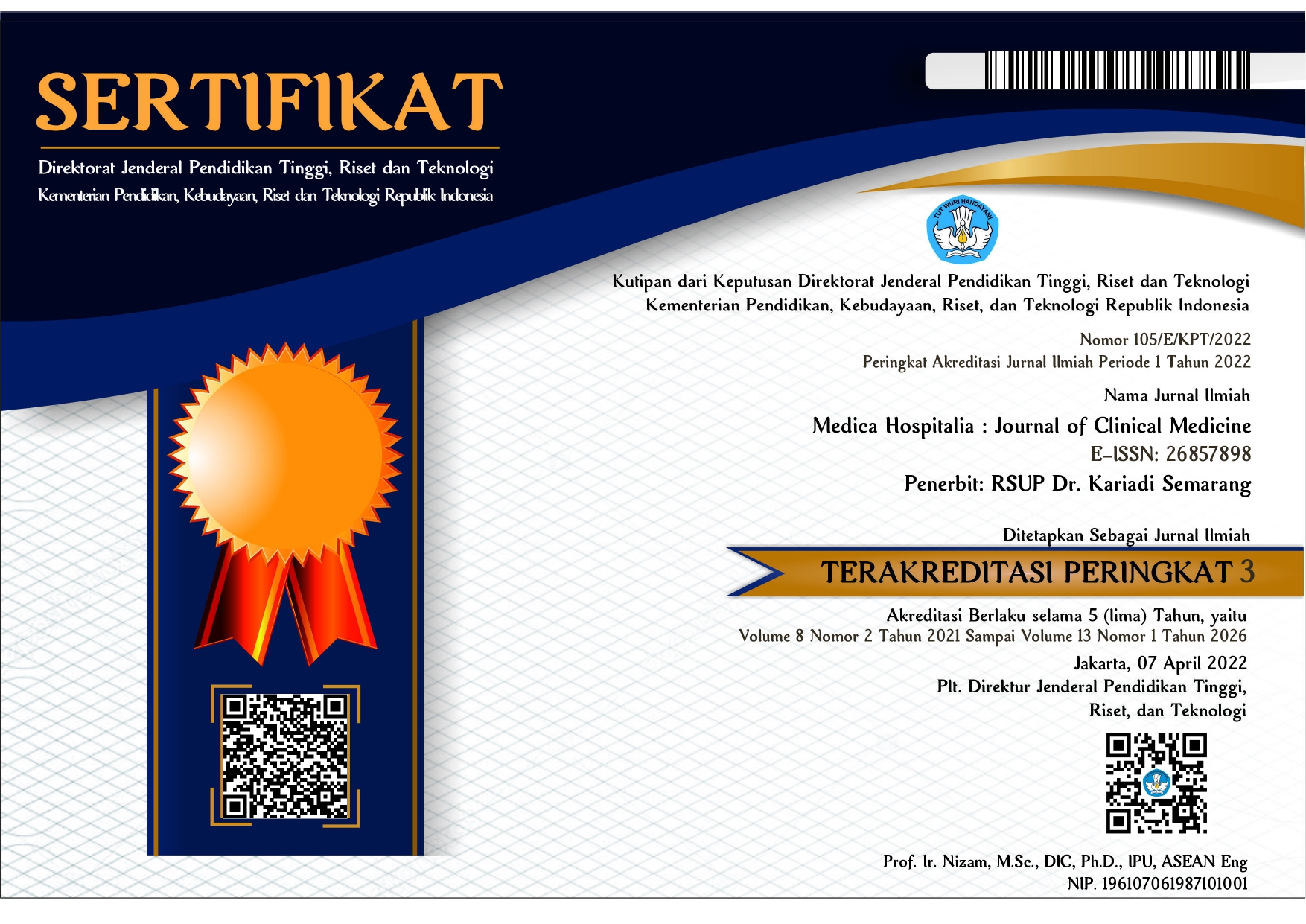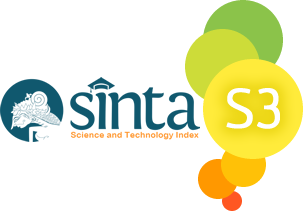Covid-19 dan Koinfeksi Penyakit Parasit
DOI:
https://doi.org/10.36408/mhjcm.v7i1A.471Keywords:
Covid-19, koinfeksi, malaria, cacingan, penyakit parasitAbstract
LATAR BELAKANG: Kondisi pandemi, kasus Covid-19 semakin meningkat, manifestasi klinis seperti demam, batuk, diare, muntah, sakit kepala, mialgia dan kelelahan, mungkin sulit untuk membedakan COVID-19 dari spektrum penyakit dengan manifestasi serupa, seperti malaria dan cacingan, terutama di daerah endemik. Di Indonesia belum ada artikel yang membahas Covid-19 dengan koinfeksi malaria dan cacing. TUJUAN: Tujuan penulisan ini adalah menelaah dampak klinis infeksi Covid-19 dengan komorbid infeksi parasit yaitu malaria dan kecacingan. METODE: Penelusuran kepustakaan 154 jurnal, terdapat 4 jurnal yang relevan. DISKUSI: Manifestasi klinis malaria yang parah terjadi karena respon proinflamasi yang meningkat, hal yang sama terjadi dalam banyak kasus COVID-19. Koinfeksi Malaria dan COVID-19 dapat menyebabkan respons pro-inflamasi yang berlebihan, manifestasi klinis lebih parah dan prognosis buruk. Berdasarkan imunopatogenitas dari infeksi cacing di daerah endemis, dikhawatirkan hal tersebut akan meningkatkan keparahan gejala Covid-19 pada pasien dengan koinfeksi cacing. KESIMPULAN: Pada kasus Covid-19 yang diikuti dengan koinfeksi malaria menunjukkan keparahan manifestasi klinis akibat peningkatan respon inflamasi. Diduga bahwa respon imun hospes terhadap cacing akan memberikan dampak klinis yang lebih berat pada kasus Covid-19.
Kata kunci: Covid-19, koinfeksi, malaria, cacingan, penyakit parasit
BACKGROUND: The condition of the Covid-19 pandemic where the number of cases is increasing. Clinical manifestations such as fever, cough, diarrhea, vomiting, headache, myalgia and fatigue, it may be difficult to distinguish COVID-19 from the spectrum of diseases with similar manifestations, such as malaria and intestinal worms, especially in endemic areas. Indonesia there are no articles discussing Covid-19 with malaria and worm coinfection. OBJECTIVE: The purpose this article is to review the clinical impact of Covid-19 infection with comorbid parasitic infections, in this case malaria and worms. METHOD: Search the literature of 154 journals, there are 4 journals that are relevant DISCUSSION: The severe manifestations of malaria occur because of an increased proinflammatory response, the same thing happens in many cases of COVID-19. Malaria coinfection and COVID-19 can then cause excessive pro-inflammatory responses, severe manifestations and a poor prognosis. In addition, based on immunopathogenicity from worm infections in endemic areas, it is feared that this will increase the severity of Covid-19 symptoms in patients with worm co-infection. CONCLUSION: In the case of Covid-19 followed by co-infection with malaria, it shows the severity of clinical manifestations due to increased inflammatory response. Tobe assumed that the host's immune response to worms will have a more severe clinical impact in the Covid-19 case.
Keywords: Covid-19, coinfection, malaria, intestinal worms, parasitic diseases
Downloads
References
2. Kemenkes RI. Info Infeksi Emerging: Laporan Gugus Tugas Covid-19 2020. Jakarta. Available at: https://covid19.kemkes.go.id/category/situasi-infeksi-emerging/info-corona-virus/#.XyyzkEExc3Y
3. Sundus sardar, Rohit Sharma, Tariq YMA, Mohamed Aboukamar. Covid-19 and Plasmodium vivax Malaria Co-infection. 2020. Elsevier. Available at: https://doi.org/10.1016/j.idcr.2020.e00879
4. Ummamah N. Mengatasi ancaman malaria: Antara News. 2020. Available at: http://m.harnas.co/2020/05/01/mengatasi-ancaman-malaria
5. Wu Z, McGoogan JM,. Characteristics of and important lessons from the coronavirus disease 2019 (COVID-19) outbreak in China: summary of a report of 72314 cases from the Chinese Center for Disease Control and Prevention. 2020. JAMA323: 1239–1242.
6. CDC. Parasites. 2020. Available at: https://www.cdc.gov/parasites/.
7. American Academy of Pediatrics, 2018. Red Book: 2018 Report of the Committee on Infectious Diseases, 31st edition. Itasca, IL:American Academy of Pediatrics.
8. Richard S., David P, Andrew G, Siddharta M. Will helminth co-infection modulate Covid-19 severity in endemic regions?. 2020. Available at: https://doi.org/10.1038/s41577-020-0330-5
9. Huang C. Clinical features of patients infected with 2019 novel coronavirus in Wuhan, China. 2020. Lancet 395, 497–506
10. Brosschot, T. P. & Reynolds, L. A. The impact of a helminth- modified microbiome on host immunity. 2018. Mucosal Immunol. 11, 1039–1046
11. Lai CC, Wang CY, Hsueh PR. Co-infections among patients with COVID-19: the need for combination therapy with non-anti-SARS-CoV-2 agents? [published online ahead of print, 2020 May 23]. J Microbiol Immunol Infect 2020(20), Available at: http://dx.doi.org/10.1016/j.jmii.2020.05.013 S1684-S1182 30127-4.
12. Lam LTM Chua YX, Tan DHY. Roles and challenges of primary care physicians facing a dual outbreak of COVID-19 and dengue in Singapore. Fam Pract 2020, Available at doi: http://dx.doi.org/10.1093/fampra/cmaa047
13. Akanmori BD, Kurtzhals JA, Goka BQ, Adabayeri V, Ofori MF, Nkrumah FK et all. Distinct patterns of cytokine regulation in discrete clinical forms of Plasmodium falciparum malaria. Eur Cytokine Netw 11: 2017; 113–118
14. Gutman JR, Lucchi NW, Cantey PT. Malaria and Parasitic Neglected Tropical Diseases: potential Syndemics with COVID-19? [published online ahead of print, 2020 jun 1]. Am J Trop Med Hyg 2020;10:, Available at: doi: http://dx.doi.org/10.4269/ajtmh.20-0516 4269/ajtmh.20-0516
15. Mvumbi DM. Mass intake of hydroxychloroquine or chloroquine in the present context of the Covid-19 outbreak: possible consequences in endemic malaria settings. Med Hypotheses 2020;143:109912, Available at : http://dx.doi.org/10.1016/j. mehy.2020.109912
16. Uzun T, Artesunate Toptas O. could be an alternative drug to chloroquine in COVID-19 treatment? Chin Med 2020;15:54, Available at http://dx.doi.org/10.1186/s13020-020-00336-8
17. Maizels RM, McSorley HJ. Regulation of the host immune system by helminth parasites. J Allergy Clin Immunol 138: 2016; 666–75.
18. Campbell SJ. Complexities and perplexities: a critical appraisal of the evidence for soil-transmitted helminth infection related morbidity. PLoS Negl Trop Dis 10: 2016 e0004566.
19. Moreels T, Nieuwendijk R, De Man J, Winter D, Herman A, Van Marck E et al. Concurrent infection with Schistosoma mansoni attenuates inflammation induced changes in colonic morphology, cytokine levels, and smooth muscle contractility of trinitrobenzene sulphonic acid induced colitis in rats. Gut. 2016;53(1):99-107.
20. Epidemiology NCPER. The epidemiological characteristics of an outbreak of 2019 novel coronavirus diseases (COVID-19) in China. Zhonghua Liu Xing Bing Xue Za Zhi. 2020 Feb 10;41(2):145-151.
Additional Files
Published
How to Cite
Issue
Section
Citation Check
License
Copyright (c) 2020 Medica Hospitalia : Journal of Clinical Medicine

This work is licensed under a Creative Commons Attribution-ShareAlike 4.0 International License.
Copyrights Notice
Copyrights:
Researchers publishing manuscrips at Medica Hospitalis: Journal of Clinical Medicine agree with regulations as follow:
Copyrights of each article belong to researchers, and it is likewise the patent rights
Researchers admit that Medica Hospitalia: Journal of Clinical Medicine has the right of first publication
Researchers may submit manuscripts separately, manage non exclusive distribution of published manuscripts into other versions (such as: being sent to researchers’ institutional repository, publication in the books, etc), admitting that manuscripts have been firstly published at Medica Hospitalia: Journal of Clinical Medicine
License:
Medica Hospitalia: Journal of Clinical Medicine is disseminated based on provisions of Creative Common Attribution-Share Alike 4.0 Internasional It allows individuals to duplicate and disseminate manuscripts in any formats, to alter, compose and make derivatives of manuscripts for any purpose. You are not allowed to use manuscripts for commercial purposes. You should properly acknowledge, reference links, and state that alterations have been made. You can do so in proper ways, but it does not hint that the licensors support you or your usage.

























